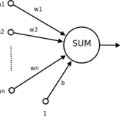The mechanical behavior of inelastic materials with microstructure is very complex and hard to grasp with heuristic, empirical constitutive models. For this purpose, multiscale, homogenization approaches are often used for performing reliable, accurate predictions of the macroscopic mechanical behavior of microstructured solids. Nevertheless, the calculation cost of such approaches is extremely high and prohibitive for real-scale applications involving inelastic materials. Recently, data-driven approaches based on deep learning have risen as a promising alternative to replace ad-hoc constitutive laws and speed-up multiscale numerical methods. However, such approaches lack a rigorous frame based on the laws of physics. As a result, their application to model materials with complex microstructure in inelasticity is not yet established. Here, we propose Thermodynamics-based Artificial Neural Networks (TANN) for the constitutive modeling of materials with inelastic and complex microstructure. Our approach integrates thermodynamics-aware dimensionality reduction techniques and deep neural networks to identify the constitutive laws and the internal state variables of complex inelastic materials. The ability of TANN in delivering high-fidelity, physically consistent predictions is demonstrated through several examples both at the microscopic and macroscopic scale. In particular, we show the efficiency and accuracy of TANN in predicting the average and local stress-strain response, the internal energy and the dissipation of both regular and perturbed lattice microstructures in inelasticity. Finally, a double-scale homogenization scheme is used to solve a large scale boundary value problem. The high performance of the homogenized model using TANN is illustrated through detailed comparisons. An excellent agreement is shown for a variety of monotonous and cyclic stress-strain paths.
翻译:具有微结构的无弹性材料的机械行为非常复杂,而且很难用超常、实证的构件模型来掌握。为此,往往使用多尺度的同质化方法来对微结构固体的宏观机械行为进行可靠、准确的预测。然而,这种方法的计算成本极高,对于具有无弹性材料的成形应用而言,这种方法的计算成本也极高,而且难以使用。最近,基于深层次学习的数据驱动方法作为一种有希望的替代方法,取代了顶级成份法和加速的多级多级数字方法。然而,这种方法缺乏基于物理定律的严格框架。因此,在具有弹性的复杂微结构的模拟材料中,应用多尺度的多尺度的同质化方法,因此尚未建立这些方法对具有复杂性的模拟材料的应用。在这里,我们提议以热动力化为基础的人工神经网络(TANN) 用于无弹性和复杂的微结构材料的建模模型。我们的方法结合了热动力-自觉的溶质性消化技术和深层的神经网络,以辨识法和内部的精度变异性材料的状态变量变量变量变量。在常规规模的变现中展示了高等级的精确的精确的系统,在不断的精确的系统上展示中表现的精确的系统,在不断的系统上显示的精确的机能的精确性变现。我们所演化的机能的机能的机能的精确性能的精确性能,通过。在高级的模型中显示的精确性能,在使用。




